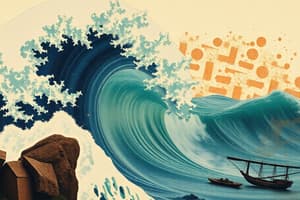Podcast
Questions and Answers
What is the most common cause of tsunamis?
What is the most common cause of tsunamis?
- Submarine earthquakes (correct)
- Volcanic eruptions
- Meteorite impacts
- Underwater landslides
Which geological event can lead to tsunamis by displacing water through rapid sediment movement?
Which geological event can lead to tsunamis by displacing water through rapid sediment movement?
- Meteorite impacts
- Volcanic eruptions
- Man-made causes
- Underwater landslides (correct)
What is a rare but possible cause of tsunamis according to the text?
What is a rare but possible cause of tsunamis according to the text?
- Submarine earthquakes
- Underwater landslides
- Meteorite impacts (correct)
- Volcanic eruptions
Which of the following is NOT listed as a human activity that can cause tsunamis?
Which of the following is NOT listed as a human activity that can cause tsunamis?
What are some of the immediate and long-lasting effects of tsunamis mentioned in the text?
What are some of the immediate and long-lasting effects of tsunamis mentioned in the text?
What is one of the effects of tsunamis mentioned in the text?
What is one of the effects of tsunamis mentioned in the text?
Which historical tsunami resulted in the most estimated deaths?
Which historical tsunami resulted in the most estimated deaths?
What is one of the impacts of tsunamis on infrastructure?
What is one of the impacts of tsunamis on infrastructure?
Which historical tsunami primarily affected Hawaii?
Which historical tsunami primarily affected Hawaii?
Why are tsunamis considered destructive forces according to the text?
Why are tsunamis considered destructive forces according to the text?
Flashcards are hidden until you start studying
Study Notes
Tsunamis: Understanding Their Causes, Impacts, and Historical Events
Tsunamis are massive waves that originate from the sudden displacement of large volumes of water, often caused by geological events or underwater disturbances. In this article, we'll delve into the origins of tsunamis, their far-reaching effects, and some of the most significant historical occurrences.
Causes of Tsunamis
Tsunamis are typically triggered by one or more of the following events:
-
Submarine earthquakes: Most tsunamis are generated by undersea earthquakes, where the movement of tectonic plates causes the sea floor to shift, creating a bulge or depression in the water surface.
-
Underwater landslides: Rapid movement of underwater sediments, such as rock and debris, into the ocean can displace water, leading to tsunamis.
-
Volcanic eruptions: Some volcanic eruptions, especially those that occur underwater, can create large disturbances in the water column, resulting in tsunamis.
-
Meteorite impacts: While rare, impacts from large meteors or asteroids can displace water and create tsunamis.
-
Man-made causes: Tsunamis can also be caused by human activities, such as underwater explosions and land reclamation projects that change the shape of the seafloor.
Effects of Tsunamis
Tsunamis produce both immediate and long-lasting effects, including:
-
Destruction of infrastructure: Tsunamis can cause extensive damage to coastal communities, sweeping away buildings, bridges, and other infrastructure.
-
Loss of life: The combination of large waves, powerful currents, and debris can result in significant loss of life, with thousands of people often affected by tsunamis.
-
Environmental damage: Tsunamis can cause significant changes to the coastal environment, including altering habitats, displacing wildlife, and introducing new invasive species.
-
Economic impact: The destruction of infrastructure, loss of life, and environmental damage can result in significant economic losses for communities, countries, and the global economy.
Historical Tsunamis
Throughout history, tsunamis have wreaked havoc on coastal communities. Some of the most significant historical tsunamis include:
-
2004 Indian Ocean Tsunami: This event is considered one of the deadliest tsunamis in recorded history, with an estimated 230,000 people killed across 14 countries.
-
1755 Lisbon Earthquake and Tsunami: This tsunami, which struck Portugal and other countries along the Atlantic coast, resulted in an estimated 15,000 to 60,000 deaths.
-
1960 Chilean Earthquake and Tsunami: This earthquake, which occurred off the coast of Chile, resulted in a tsunami that caused an estimated 1,597 deaths, primarily in Hawaii.
-
2011 Tōhoku Earthquake and Tsunami: This tsunami, which struck Japan, resulted in an estimated 18,410 deaths and extensive damage to infrastructure and the environment.
-
2006 Java Tsunami: This tsunami, which struck Indonesia, resulted in an estimated 667 deaths.
-
2018 Papua New Guinea Earthquake and Tsunami: This tsunami, caused by an undersea landslide, resulted in an estimated 125 deaths.
Tsunamis are a powerful reminder of the destructive forces that shape our planet. While we can't eliminate the risk of tsunamis, we can improve our understanding of their causes, effects, and histories, which can help us develop better preparedness strategies and mitigation measures for the future.
Studying That Suits You
Use AI to generate personalized quizzes and flashcards to suit your learning preferences.




